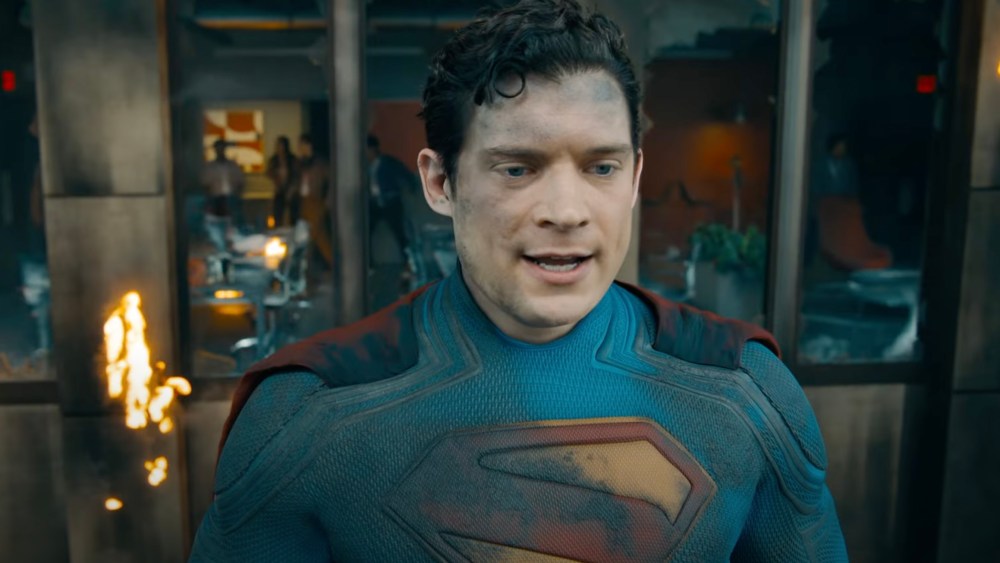SPOILER ALERT: This story discusses major plot developments, including the ending, in “Superman,” currently playing in theaters.
In the climax of “Superman” — the first feature film under the DC Studios banner, and the official big screen launch of the new DC Universe — the city of Metropolis is split in two. Lex Luthor (Nicholas Hoult) ignites a trans-dimensional rift in order to draw out Superman (David Corenswet) so he can kill the Man of Steel once and for all. As the rift slowly works its way towards the city, director James Gunn takes time to depict the citizens of Metropolis evacuating in remarkably orderly fashion, so when buildings begin to cleave apart and skyscrapers start falling like dominoes, our understanding is that most of those buildings are empty.
Sequences that evoke the terrors of 9/11 have been commonplace in superhero cinema for decades now, but what’s so striking about this new “Superman” movie is how inured the people of Metropolis are to it. They don’t like having to flee from falling rubble, but as Gunn lays out in the film’s opening moments, in this universe, super-powered beings — aka meta-humans — have been around for 300 years. Humanity has been dealing with nefarious arch-villains, fire-breathing kaiju and world-ending cataclysms caused by forces beyond human comprehension for centuries. It’s kind of old hat.
Which means Gunn can just have fun with it, without having to contend with the trauma of it all. In “Man of Steel,” when Superman (then played by Henry Cavill) and his Kryptonian nemesis General Zod (Michael Shannon) tear through Metropolis as they beat the crap out of each other, no one on Earth has seen anything like it before; the shock is so terrifying that it drives the plot of the sequel, “Batman v Superman: Dawn of Justice,” with Bruce Wayne (Ben Affleck) seeking revenge against Superman for letting it happen. In “Avengers: Age of Ultron,” the heroes’ final battle results in the country of Sokovia exploding in the sky; it causes so much collateral damage that the entire planet claps back at the superheroes with the Sokovia Accords in “Captain America: Civil War.” Later, Thanos snapping half the universe from existence in “Avengers: Infinity War,” only for that half to be blipped back into being five years later in “Avengers: Endgame,” is such an overwhelming experience that it’s continued to reverberate within the Marvel Cinematic Universe.
Those storytelling choices worked at least in part because audiences craved big budget entertainment that exorcised the fears and anxieties that haunted the world after 9/11. The need for that, however, has long passed; we’re facing a whole new horde of horrors, which Gunn seems to understand. The Lex Luthor in this “Superman” is a billionaire sociopath who weaponizes social media with disinformation campaigns and thinks nothing of secreting bothersome civilians into an extrajudicial gulag, hidden away from public view.
Crucially, however, the emotional adversities that most challenge the characters in “Superman” are internal conflicts rather than external dangers. Superman discovers that his biological parents were actually pretty shitty and sent him to Earth to rule it; Lois Lane (Rachel Brosnahan) spins out over commitment issues after Superman declares his love for her. But a rift ripping apart Metropolis? That’s just another day at the office.
In a different era of superhero movie, Superman learning that Ultraman, Lex’s secret weapon, is actually Superman’s clone would’ve wracked our hero with existential self-doubt. How can I possibly fight myself?! Does this mean I’m capable of true darkness?? Woe betide the Last Son of Krypton!
In this movie, Superman whistles for help from his dog Krypto and yeets his clone into a black hole. Fun!
A common observation about Gunn’s “Superman” is that it feels like a comic book from DC’s Silver Age come to life, which is a nerdy way of saying that the film evokes a time when this kind of storytelling was, first and foremost, a conduit for pop-y escapism. By making super-heroic derring do an everyday occurrence in the DCU, Gunn has liberated DC Studios from having to always factor in what it would actually feel like to see a flying man shoot heat rays from his eyes.
At the end of the movie, Superman’s compatriot Mister Terrific (Edi Gathegi) reverses the rift and zips Metropolis back together, leaving the city with a literal scar through its center but, seemingly, not that much worse for the wear. The film’s two end credit scenes emphasize this idea: The first consists of a shot of Superman and Krypto sitting together on the moon as the Earth spins, gorgeously, in the background — a quiet moment utterly devoid of stress or worry. In the second, Superman and Mister Terrific look at the crack in one of the Metropolis buildings that had been torn apart and snapped back together again. Superman observes that the each side didn’t quite come together perfectly.
“It’s just a little off,” he tells Terrific, who does not appreciate the Man of Steel’s nitpicking.
“What do you want me to do?” Terrific yells. “You want me to take it apart and put it back together?!”
As he storms off, Superman immediately tries to apologize: “Hey man, I’m sorry, I didn’t mean to bum you out. Shouldn’t have brought it up!” Then, to himself, he says, “Darn it. I can be such a jerk sometimes.”
So breezy, so uncomplicated, so fun. And the fact that neither scene directly teases an upcoming project in the DCU — like “Supergirl,” “Lanterns” or “Peacemaker,” all of which are alluded to earlier in the two-hour runtime — only further decouples this movie from the last 25 years of superhero filmmaking.
None of this, Gunn seems to be saying, needs to be that serious anymore.
